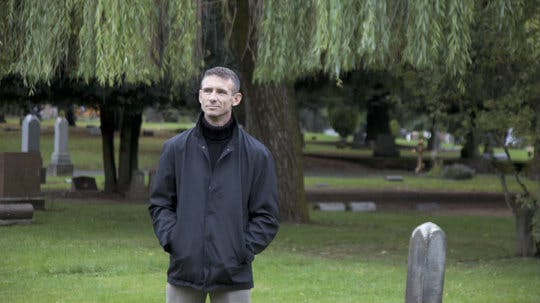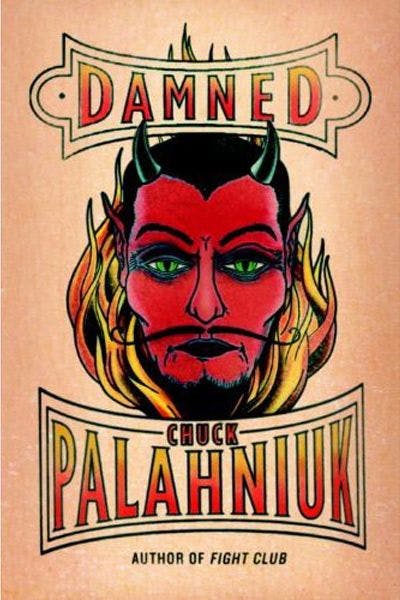PORTLAND, ORE. -- Chuck Palahniuk's hand is sore.
Not long before we met for an interview in late October, the bestselling writer had been autographing copies of "Damned," his new coming-of-age novel narrated by a 13-year-old girl who dies and lands in hell.
"I spent a week in the warehouse signing close to 10,000 books," he said. "Last year I signed 15,000 copies. That's work."
Call it Palahniuk Industries. When promoting his books, Palahniuk goes for the large-scale rock-tour model, not the genteel bookshop reading. The books he autographed by the pallet-load don't include the ones he signs for zealous fans at often sold-out theater events that have included Palahniuk tossing inflatable sex dolls and fake severed limbs into the audience.
For "Damned," Palahniuk is visiting 13 U.S. cities in November and December, including St. Paul, where he'll be a guest on Talking Volumes, the live-event book club, Nov. 17 at the Fitzgerald Theater.
Palahniuk, 49, has seen his notoriety grow since the 1996 publication of his first novel, "Fight Club." He's sold between 4 and 5 million books. And there are the video games, movie tie-ins and a fan base fueled by Twitter and his website, The Cult. He has been remarkably prolific.
"Every year there had to be at least one book, or I wasn't working hard enough," said Palahniuk, whose other novels include "Pygmy," "Rant" and "Choke." "Damned" is his 12th novel, and he's also written two nonfiction books. "The winters here are so gray and long that it's easy to do a book over every winter."
"Here" is the chronically overcast Pacific Northwest, where Palahniuk grew up. He and his partner share a rehabbed house near Vancouver, Wash., not far from Portland, Ore., a city he wrote about in a nonfiction collection called "Fugitives and Refugees."
We meet at a friend's comfortably appointed condo in southeast Portland, a very green, very neat residential area dotted with the city's omnipresent food trucks and coffee shops.
Soft-spoken and thoughtful, Palahniuk looks more like a model in a Banana Republic ad than the tortured creator of the bloody, mayhem-filled dystopia that is "Fight Club." He has the wiry physique of someone wrestling at about 165 pounds. He's wearing loafers, wide-wale corduroy slacks and a thick black cable-knit sweater.
Creating Tyler Durden, casting Brad Pitt
Before getting to the latest book, a word is needed about Palahniuk's fiction debut, since he is still often introduced as "the author of 'Fight Club.'"
That 215-page book grew out of a short story (now Chapter 6) and sold to Norton for a $6,000 advance. In it, disaffected young men, including a middle manager/narrator, fall under the influence of autocratic leader Tyler Durden. They join Project Mayhem, a fast-growing cult dedicated to the "complete and right-away destruction of civilization." The book sold modestly at first, achieving bestseller status only three years later thanks to the movie version, directed by David Fincher and starring Edward Norton as the narrator and Brad Pitt as antihero Durden.
(The book's female lead character, Marla, is played in the movie by Helena Bonham Carter. Palahniuk says that Courtney Love wanted the part, but Fincher said no, because "she was just too close to type, and to have any kind of energy, you had to cast against type a little bit.")
"Fight Club" has gone on to be a cultural signifier, parodied on "Saturday Night Live," vilified for inspiring actual fight clubs worldwide, and kept in print in a dozen languages.
Some "Fight Club" trademarks -- youthful disaffection, violence, gross-out humor, a dystopic setting, cultural satire as an extreme sport, a decent helping of third-act pathos -- can be seen in Palahniuk's subsequent novels, including "Damned."
Even prepubescent Madison Spencer, the protagonist of "Damned," has traits that could be seen as Tyler Durden-esque. She's disaffected from society (i.e., those still alive), she kicks serious butt and is a cultural critic who becomes an unlikely leader.
Palahniuk said he modeled Madison partly after a well-known comic-book character.
"Like Margaret in the 'Dennis the Menace' comics, she's that archetype of the very mouthy, super-confident little girl, before puberty kind of wipes her out," he said. "At the same time, I wanted her to be very naive in regard to physicality. Margaret could tell you anything about blank, but when you ask her where babies come from, she gets it wrong."
"Damned" is told entirely from Madison's perspective, including her direct, Judy Blume-like "Are you there, Satan?" queries at the start of each chapter.
She has died, reportedly from a marijuana overdose, and been cast into Hades, where she recalls her unusual upbringing by a billionaire father and a movie-star mother who is prone to adopting needy children as a PR stunt, and then shipping them off to boarding schools.
Multiple rewrites
While Palahniuk says he wrote "Fight Club" in two months, "Damned" took more than two years, including extensive revising of the book's ending at the suggestion of his editor.
Palahniuk said he coped easily with the fact that Madison is different from himself in age and gender, but her highly verbal, spiky character put him at odds with his default minimalist style.
"I had to throw out a lot of rules in order to write in Madison's voice," he said. "She's allowed to use adverbs, she's allowed to use abstraction and Latinate words, things I could never get away with in minimalism. She's allowed to overtly state emotional reactions."
Though Palahniuk never has written multi-book series, he is captivated enough by Madison to cast her in at least two more novels. In "Doomed," which he's working on now, she's in purgatory. Later, in "Delivered," she will arrive in heaven.
Death and dying played a part in Palahniuk's decision to set a book in hell. His mother was diagnosed with cancer in 2008, and Palahniuk (whose father was murdered in 1999 by his girlfriend's ex-boyfriend) spent a lot of time at her bedside, leaving several times to attend premieres of the movie version of his novel "Choke." (His mother died early in 2009.)
"It was just excruciating, having to live this comedy and tragedy at the same time," he said. "So, to give myself perspective, writing about hell just seemed like taking it to a fictional extreme."
From Sartre to Molly Ringwald
His research ranged widely. "I read Dante, and [John-Paul] Sartre's 'No Exit,' and that was kind of my entree into 'The Breakfast Club.'" In hell, Madison falls in with a pack of teenage types -- brainy geek, jock, punker, cheerleader -- straight out of that classic school-detention movie from 1985.
In Palahniuk's version of hell, the fantastic merges with the mundane. Under a flame-orange sky, in a landscape recast with bodily detritus (Dandruff Desert, "oceans of scalding-hot barf"), Madison and her pals encounter monstrous mythical demons as well as history's leading despots. The primary employment is telemarketing, and the movie "The English Patient" plays continuously.
Palahniuk has "no idea what will happen to us when we die," but he believes that in an increasingly secular society, people lack the "narrative that once comforted us in the face of death. Since we've discarded so much religion, we've discarded these very useful stories that come with it."
It's hard to pitch the broadly satirical "Damned" as a useful replacement narrative of life after death, but it's a rollicking adventure of Swiftian proportions, a Valleyfair of the Underworld that, incidentally, shows an overweight teenage girl bringing Satan himself down a peg.
- Follow Claude Peck on Twitter: @claudepeck

